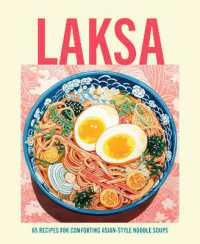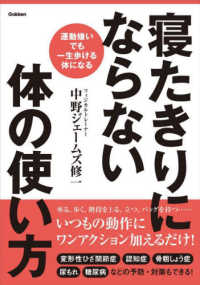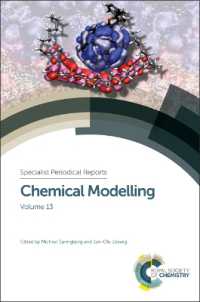- ホーム
- > 洋書
- > 英文書
- > Literary Criticism
Full Description
Such was the immediate and widespread interest in George Eliot's fiction, that, according to an early reviewer, "the universal question in men's mouths... is have you read 'Adam Bede'?". In the 1990s, as evidenced by Eliot's central place in university courses on the novel, the Victorian period and feminism, and by a popular television adaptation of "Middlemarch", this interest is undiminished. The radicalism of her co-habitation with George Lewes contrasts provocatively with the apparent moral conservatism with which she treats her fictional heroines. But in her novels, she pushes sexual politics beyond the domain of the personal and comestic into what is realistic in the public arena. Her novels engage with shaping forces of her age, from Rousseau to poritism to Darwinism. Great novelists, from Dickens and Henry James onwards, have responded to her with acclaim. For Edith Wharton and Virginia Woolf, she was a reassuring inspiration. She continues to be relevant to the issues of our time, Irving Howe supports the zionism of Daniel Deronda, while Edward Said challenges it. This four-volume set follows the series format in having a substantial critical apparatus consisting of a short introductory overview, a chronology of Eliot's life, full bibliographies of her works and of critical writings and a chronological list of the criticism included. Volume I contains the critical apparatus and is then devoted to the 19th-century response - biographical, reviews (chronologically by title), and then a section of responses from three leading writers - Charles Dickens, Anthony Trollpe and Henry James. Volume II concentrates on 20th-century perspectives (1900-1970), starting with Leslie Stephen's "George Eliot" (1902) continuing with, among others, Edith Wharton, G.K. Chesterton, Virginia Woolf, Edmund Gosse, Arnold Bennett, F.R. Leavis, V.S. Pirtchett, Marcel Proust and ending with J. Hillis Miller, Raymond Williams and Rosalind Wade. Volume III is devoted to critical essays (from 1918 to the present) on individual works, each section arranged chronologically, starting with "Scenes of Clerical Life" (1858) and ending with a section on her poetry. Volume IV explores other responses, from 1970 to the present, and includes the following sections - "Influences on George Eliot", Feminist issues" and "History, politics and realism".


![魔法使いの嫁 〈23〉 - エコバッグ付き特装版 [特装版コミック] ブシロードコミックス (特装版)](../images/goods/ar2/web/imgdata2/40489/4048996908.jpg)





